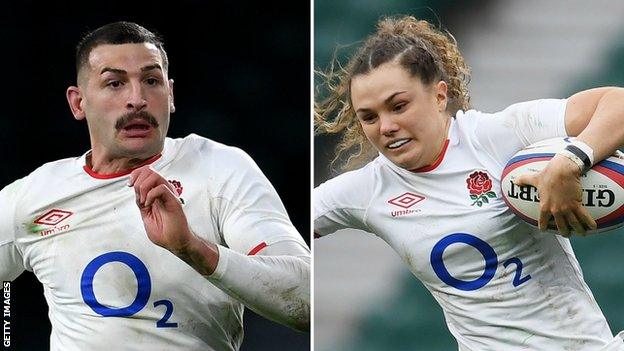England rugby teams lay on a Twickenham feast against Ireland and France
- Published
England 25-23 France: Emily Scarratt seals Red Roses win with last kick of game
There is a rhythm in the life of a rugby fan. A rhythm that usually revolves around Saturdays.
A day that means cold feet on a muddy touchline for those watching or, for those playing, steam rising from the warmth of a scrum.
With England supporters halfway through the country's most recent lockdown and community rugby on pause, weekends have changed.
But for one grey, November day in south-west London, Saturday suddenly made a welcome return.
For rugby fans experiencing an oval ball-shaped famine, two England sides laid on a Twickenham feast for those watching on television or via streaming services.
The first of Saturday's two games, between England and France's women, was everything sport should be. It had all of the necessary ingredients to rustle up a perfect escape.
There was an underdog. France, playing in a country in which they had not won for five years against a side by whom they had been beaten six times in a row.
There was a comeback. The opposition were ferocious, revolting against years of English dominance and at times being wonderfully French.
Full-back Shannon Izar scythed across the field on the counter-attack and found wing Cyrielle Banet, who stepped around defenders to score.
France extend lead thanks to Cyrielle Banet's magnificent try
The visitors eventually built a 13-point lead. But somehow, miraculously, the tide turned.
With nine minutes to go, Poppy Cleall barrelled over in a maul - eight points in it. Then rising star Ellie Kildunne stayed standing where many others would fall - one point left.
Then, as the clock went red, there was a familiar hero. World player of the year and Six Nations player of the championship Emily Scarratt made another mark in the rugby history books as her penalty sealed a memorable victory.
And afterwards there was even a humble leader. In the week that the Rugby Football Union rejected its classification as a "posh" sport, captain Katy Daley-Mclean, standing in for the injured Sarah Hunter and becoming England's third-most capped player, took a moment to reflect on where she had come from.
"Playing for England is a massive honour," she said. "As a girl from South Shields, I never dreamed I'd be standing here like this but that was one hell of a game."
There were no fans but as those present took in what they had just seen, the Twickenham air took on that magic tinge that sporting perfection exudes.
And it seemed that haze fell on the pitch and infused itself in England's male players as they took to the turf about an hour after the women's match finished.
Supporters had been going back and forth about the side's style of play since rugby's return in October.
On one side, those who disapproved of the forwards-dominated win against Georgia. On the other, those who were happy to take wins in whatever form they came.
But both camps sat up to notice when, against Ireland, scrum-half Ben Youngs took a quick tap penalty instead of giving captain Owen Farrell the chance to kick at goal.
This was not going to be like last week.
Several women's players stepped into the limelight in the previous match and the men would not be overshadowed by the Red Roses' scintillating performance.

Wing Jonny May and full-back Ellie Kildunne both impressed at Twickenham
Jonny May immediately stepped up. Breath was held as Farrell's cross-field kick to the wing hung high in the afternoon sky.
May leaped and reached higher than Ireland's Hugo Keenan to gather and score, but that was just a starter.
What came next would have been dissected and repeated in pubs long into the night in pre-pandemic times, but is more likely a central theme in several Whatsapp groups now.
It came on suddenly. May beat a defender on his own 22, then within a blink he was halfway up the pitch.
He chased his own kick, beating Ireland scrum-half Jamison Gibson-Park, and it looked as if he was caught metres from the tryline.
One more tap of the foot was all it took and he was across, moving alongside Ben Cohen and Will Greenwood as England men's second most prolific try-scorer on 31.
For a moment, vaccines, festive bubbles and facemasks faded away - there was only rugby.
From there, the match cooled to a gentle simmer. England fans held out to see how long their side could go without conceding a point.
Italy had been the last team to score against them two matches ago but, 215 minutes later, Ireland's Jacob Stockdale brought the pointless run to an end.
Men's head coach Eddie Jones had caused a characteristic stir with some pre-match comments but, like his Red Roses counterpart Simon Middleton, he also said his side wanted to make fans smile.
In the end, both teams did more than that. They gave their supporters Saturday back.

Watch Premier League football live on BBC iPlayer: Fulham v Everton - find out more here
